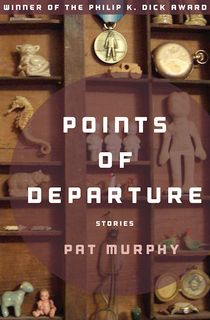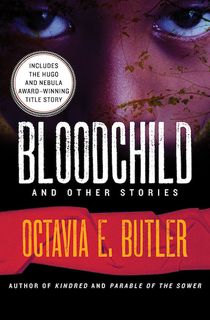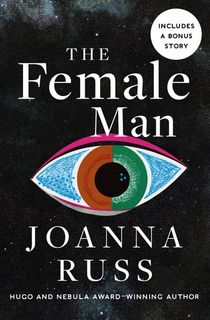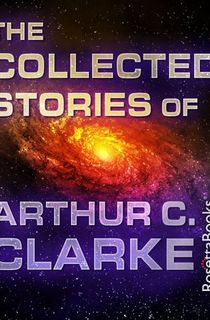We love a sci-fi novel as much as the next person, but it can also be incredible to devour a totally new reality in one reading session. In this oversaturated landscape of entertainment— from instant streaming to the endless scrolling of social media —short stories offer a concise way to escape. Plus, some of them are even available to read online today for free! So what are you waiting for? Hand yourself over to another reality with these beautifully crafted sci-fi short stories.
"Rachel in Love" by Pat Murphy
After Dr. Aaron Jacobs’ daughter and wife are killed in a car accident, he falls into despair. Luckily, he kept some of his daughter Rachel’s brain waves in his lab. He uses a chimpanzee and implants Rachel into its brain. Rachel can’t talk, but Jacobs teaches her sign language as she comes to terms with memories of her life as a chimpanzee and as a human.
But Rachel’s father dies, and she’s taken to a primate research center, where no one knows that she’s really a young human girl. Rachel takes a liking to a deaf janitor, with whom she can speak sign language. The story gives a new meaning to belonging in the wrong body, and we’re left to deal with the reality of how closely related we humans really are to animals.
"Bloodchild" by Octavia E. Butler
In "Bloodchild," Octavia E. Butler imagines a relationship between humans and aliens where neither party defeats the other; they are symbiotic. Gan, a young boy, lives on the Tlic planet, where insect-like aliens use humans to host their eggs. For humans, it is an honor to be chosen as a host, and the Tlics enjoy the benefits of the humans.
RELATED: 14 Octavia Butler Books: The Complete Canon
Gan is chosen to carry the eggs of a powerful female Tlic. However, will the risks of being a host outweigh the honor it would bring to his family? The story explores themes of slavery, dominant races, and the disempowerment of being pregnant with something unwanted or dangerous.
"When It Changed" by Joanna Russ
Written in 1972, the science fiction short story When it Changed takes place on the planet of Whileaway, which is made up completely of women. The women have lived without men for hundreds of years and even populate together. The world is no utopia, but the women of Whileaway are generally very happy. One day, four male astronauts arrive.
RELATED: The Enduring Anger of Joanna Russ
Janet and Katy, a married couple with three children, are alarmed by the arrival of the alien men. Not only are they larger than what the women are used to, the men are constantly questioning the gender roles of the women and this causes unrest in Whileaway. Ahead of her time, Joanna Russ recognized the ways in which gender roles make equality harder to achieve. She knew that society will never succeed if men continue to undercut women.
"The Nine Billion Names of God" by Arthur C. Clarke
When religion and computers collide, the night sky goes dark. This is what happens when monks from Tibet attempt to identify every name for God, which they assume could be up to nine billion, hence the name of the story. Two Westerners have built a cataloguing machine, and the monks believe this could speed up their process of naming from hundreds of years to just a couple of months.
But what will happen when they get all the names? The Westerners begin to worry that the monks will be upset with them when the machine isn’t helpful to their cause. As they leave to get back to civilization, they realize that they might have been the foolish ones all along. Because the Nebula Awards first started being awarded in 1966, this 1953 story missed out on the honor. However, it has since been recognized as one of the best science fiction stories written before the inaugural Nebula Awards.
"Flowers for Algernon" by Daniel Keyes
Through journal entries, we follow the main character of this short story, Charlie Gordon, on a path of gaining and then losing intelligence. Though brief, Charlie’s story is heartbreaking to read. The story won the Hugo Award in 1960 and was later made into an expanded novel, which won the Nebula Award in 1966.
Charlie undergoes an experimental operation to triple his intelligence. He’s measured against Algernon, a mouse with the same operation and lasting intelligence. But the new intellect isn’t good for everything. Charlie realizes that he’s a joke to his “friends,” and he finds that he can’t connect to anyone around him. When Algernon begins to decline, Charlie worries that neither of them will be able to maintain their intelligence forever.
Daniel Keyes wrote the short story after teaching English to students with special needs. Because of the brutal ending, many publishers wanted Keyes to change it, but he always refused. We’re grateful he held his ground. With the sting of the ending, we’re also forced to reconcile with morality, genius, and the science of intelligence.
RELATED: Read Jeff VanderMeer's Short Story "The Goat Variations"
"The Ones Who Walk Away from Omelas" by Ursula K. Le Guin
The city of Omelas is perfect. Set in another world and unknown time period, children dance through tall grass by the sea, and horses stand with braided manes. The residents are happy, there is enough of everything for everyone, and every year the people of Omelas gather for a summer festival. The narrator knows that the reader thinks it must be too good to be true, but they insist that Omelas is perfect. We won’t give the twist ending away, but it’s far more cruel than you’d expect.
RELATED: 9 Moving Quotes from Sci-Fi Master Ursula K. Le Guin
The narrator in this Ursula K. Le Guin story pushes the reader to accept the things in Omelas that may seem a little too perfect. For though the city is an apparent utopia, there is always a cost to uphold perfection. Omelas’ residents have chosen to ignore the dirt beneath to make way for general beauty and joy.
"Slow Tuesday Night" by R.A. Lafferty
When you read “Slow Tuesday Night,” prepare for some major whiplash. Scientists have discovered how to remove the “Adebaios block” from the human brain, and decision-making is no longer a problem. Cities are rebuilt and destroyed in a matter of hours, marriages last half an hour, and a man can lose and gain four multi-billion dollar fortunes throughout a night.
Basil Bagelbaker pines for Ildefonsa Impala every night, but she only marries the richest of men. That means she marries and divorces about four times a day. The beauty of the decision-less world is that Basil can wait for Ildefonsa nightly. Perhaps the next day he’ll be the richest man in the city. In a time of working late and waiting for the weekend, people working today wish time would speed by, but there’s something nauseating about watching a city and its residents burn and rise like a phoenix fifty times in an eight hour period.
RELATED: We're Getting an Animated Star Trek Series About "Lawless Teens"
"Story of Your Life" by Ted Chiang
Even if you’ve already seen Arrival, the movie adaption of “Story of Your Life”, make time to read the story. It’s really unlike any other alien story in the way that it’s just not about the aliens. Like other sci-fi stories, it focuses on how we view the passage of time. Louise Banks is a linguist called to solve the language of the mysterious Heptapods, an alien species that has arrived silently.
RELATED: 13 Must-Read Hugo Award-Winning Books
As Louise works with her scientist counterpart, Gary, she remembers the painful death of her daughter and the small moments leading up to her current moment in life. The story explores the language and science behind Heptapods, so that even though they aren’t real, you finish the story feeling as if you’ve really studied the species with Louise.
"Welcome to Your Authentic Indian Experience" by Rebecca Roanhorse
In an age where cultural appropriation is rampant, "Welcome to Your Authentic Indian Experience" explores a Westworld-like virtual reality experience with real Native American people role-playing as “authentic Indians” at Vision Quest. The user is led through a Native American experience and quest, and even gets assigned their own Native American name.
The story follows Jesse, one of the workers at Vision Quest, who divulges his life and secrets to White Wolf, a tourist in the game. Jesse must exaggerate and appropriate his own culture. As Jesse’s life crumbles, White Wolf takes over Jesse’s identity and even takes on a Native American persona in real life. When Jesse gets laid off from Vision Quest, White Wolf, a white man, takes his job. The story is written in second person, which gives the reader the feeling of following a character. It’s a great choice, especially since the story is centered around a VR experience. Authentic Indian Experience won both the Hugo and Nebula Awards in 2017 and was written by Rebecca Roanhorse, who is Ohkay Owingeh Pueblo and African American. Roanhorse has also won the Hugo and Nebula Award for Best Novel for Trail of Lightning, the first book in her post-apocalyptic fantasy Sixth World series.
RELATED: 12 Must-Read Philip K. Dick Books
"All Summer in a Day" by Ray Bradbury
If you’ve ever taken a class on writing fiction, then you’ve probably read this. Read it again. Earthlings have migrated to Venus, where the sun only comes out every seven years for two hours at a time. The story is set in a classroom, where frail Margot is bullied relentlessly. On the day the sun is supposed to come out, the children imagine what it will be like through poems and half-formed memories about a life beyond constant rain and underground cities. Margot claims to remember that the sun is like a penny; a fire in the stove. The other children hate Margot for retaining these memories, and they plot against her in the worst way.
RELATED: Brilliant Reads for Fans of Ray Bradbury Books
In a twist of evil, Ray Bradbury gives us one of the most heartbreaking stories of all time. It also reminds us that children can be evil, even on Venus. Bradbury’s description of the sun is a great part of this story. We don’t know about you, but we’re pretty glad not to be trapped in a closet on Venus today.
"Paper Menagerie" by Ken Liu
Are you in the mood for crying? No? Well, too bad. Paper Menagerie is a story about Jack, a young boy with an American father and a Chinese mother. His mother was a mail order bride, a fact which Jack resents as he grows older after being mocked at school and by his friends. The thing is that Jack’s mom is special: The origami animals she makes him actually come alive.
She makes him a tiger, Laohu. Jack loves his animals, and it’s one of the only things he can connect with his mother in a positive way. When tragedy strikes the family, Jack realizes that he may have misunderstood everything. Yes, we cried. The story by Ken Liu was the first work of fiction to win both the Nebula, the Hugo, and the World Fantasy Award.
"The Red Thread," by Sofia Samatar
The Red Thread is set in a dystopian South Dakota, and follows Sahra and her mother. Since the collapse of a border-driven government, Sahra has been travelling around the United States with her mother and a boy named Fox. Fox left for unknown reasons, and since then, Sahra has been trying to get in touch with him via tagged messages.
The story is a warning against borders and prejudice, but it also explores the detriments of a lawless and free way of existence. While Sahra’s mother may enjoy freedom, there’s also the angst of being left behind that lingers throughout Sahra’s messages to Fox. In a world without lines, which path can Sahra follow to lead her back to safety?
"Spider the Artist" by Nnedi Okorafor
Not for the arachnophobic, Spider the Artist is set in a future Nigeria, where giant spider-like robots guard and repair the oil pipelines running through villages. The narrator is just trying to survive this reality, including her abusive husband and her withering will to live. The only thing that keeps her going is her love of playing the guitar, a tradition passed down through generations of her family.
RELATED: 12 Books About Robots Taking Over
The people of the narrator’s village see the spider-like creatures called “Zombies” as evil and incredibly dangerous. But the narrator befriends one that seems to enjoy her guitar playing and she even names it Udide Okwanka, meaning Spider the Artist. When hell breaks out between the zombies and the villagers, will music be enough to save what’s left of civilization?
This post is sponsored by Open Road Media. Thank you for supporting our partners, who make it possible for The Portalist to continue publishing the fantasy stories you love.
Featured photo: Anna Demianenko / Unsplash







